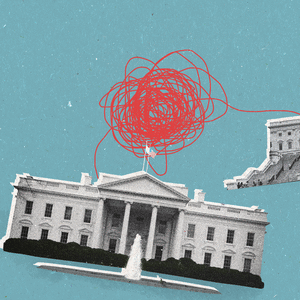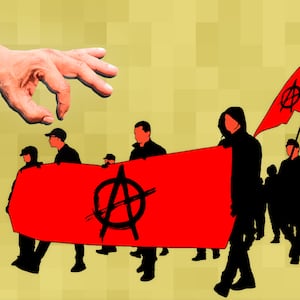If the government shutdown has any fans (besides President Donald Trump), one might assume it’s anarchists.
Anarchists want a stateless society and the government shutdown is already the longest in U.S. history. But four weeks into the shutdown, anarchists are just as fed up as the rest of the country.
“A girl can dream, right?” Kim, an anarchist organizer in New York, said when asked whether the shutdown was a state of anarchy. (As is common with anarchist organizers, she asked to withhold her full name.) “But no, our current fascist dystopian nightmare couldn't be further from any kind of anarchist utopia, even if it is sort of fun to watch politicians scramble and fret as their precious structures crumble into an utter shambles.”
Although federal workers are missing out on paychecks, anarchists’ least-favorite state functions (police and prisons, for example) are still up and running, said Eric, an associate of the anonymous anarchist website It’s Going Down.
“What we're watching is bureaucratic breakdown of the federal state. But the administrative arm is still functioning,” Eric told The Daily Beast. For instance, “if you break into a car right now you can still get arrested and sent to prison.”
Eepa, an organizer with the Indigenous Anarchist Federation, said the shutdown was “quite the opposite” of anarchy.
“Because of the government shutdown, we are living with a state that has suspended its social functions, while maintaining its oppressive institutions full time. The government only deems groups like the military, the FBI, federal law enforcement, and of course the IRS as important enough to keep functioning.”
Besides highlighting flaws with the government, Zoé Samudzi said little good can come from this kind of shutdown.
“I would hope that no one would say that this shutdown is useful. I don’t believe in accelerationism,” said Samudzi, co-author of As Black as Resistance, a book that describes black American liberation from an anarchist perspective.
“All this presidential flexing is really doing is threatening the financial stability of federal workers who aren’t receiving pay and are living paycheck to paycheck, as well as threaten folks who are dependent upon government services (like WIC and food stamp recipients).”
Pop culture and political opposition have left most Americans with a flawed understanding of anarchism and its goals, Kim said.
Modern anarchist movements often trace their origins to Pierre-Joseph Proudhon, a French philosopher who laid out the principles of a stateless society in the 1840 book What is Property? The vision took hold in parts of Europe, particularly in Paris, where a working-class and anarchist coalition ran the city in 1871’s short-lived Paris Commune movement. In the ensuing centuries, though, the movement’s philosophical roots became confused in the public imagination.
“Literal centuries of anti-anarchist propaganda later, we're left with this mangled, reductive... concept that ‘anarchy’ means ‘total fuckin' chaos, maaaaaan!’” Kim said. “I'm certain that would have Proudhon rolling in his grave.”
Anarchists aren’t in lockstep over their response to the shutdown, or anything, for that matter. Appropriately for an anti-authoritarian movement, anarchists aren’t unified by a complete set of beliefs. Subcategories of the movement promote different priorities and different models of a post-government world. The Indigenous Anarchist Federation, for instance, promotes anarchy from a Native American perspective, which invites its own views on the shutdown.
“We have additional concerns and struggles within our communities that arise out of the U.S. government shutdown,” Eepa said. “One of our major concerns is for our people, who are the victims of a government who neglects their treaty obligations to provide for the welfare of Indigenous people across the so-called United States. Tribes are being forced to find ways to help fund or substitute critical medical, psychological, and nutritional programs. Again, the fact that we have fighter jets flying over our lands everyday during the shutdown, but the nurses who care for our elders have to pay for their gas out of pocket is criminal negligence.”
Samudzi’s primary focus as as an anarchist “is less about abolishing government” and more about building alternatives to it, she said.
In policy terms for anarchists, that infrastructure often means launching food banks, arranging cheap housing and free medical treatment, and pushing for alternatives to prisons. After a series of catastrophic wildfires in northern California last year, anarchists arranged makeshift relief camps to house people still waiting for federal relief, Vice reported.
Without those alternatives, a shutdown is no good for anarchists, Samudzi said.
“Folks who push for the abolition of the government and the state without prioritizing the formation of support structures that would replace them are pushing a dangerous politic,” she said.“Boycotts (like the Montgomery bus boycott) are only successful if and when you are able to offer a sustained material substitution.”
With federal employees short on cash and the government sounding alarms about a possible end to food stamp funding in February, some anarchists are trying to scale their food programs to meet a larger demand.
“There are already anarchist projects to deal with food distribution, and housing,” Eric said. “What I've seen is people refocusing on mutual aid, but prepping for an influx of new people” using anarchist services. “I live in a relatively impoverished area where a lot of people rely on Section 8 Housing and food stamps,” he added. “If that runs out, we will be living a very different political reality.”
Native American communities, which have a unique relationship with government funding, have started practicing their own forms of community support.
“The shutdown has inspired small acts of mutual aid, a critical component of anarchism in action, across Indigenous communities,” Eepa said. “One example from my community is that people are giving up birthday money to help pay for gas and groceries for the BIA [Bureau of Indian Affairs]-contracted, now furloughed, nurses that care for our precious elders. We are finding ways of getting food distribution networks up should current food aid completely dry up.”
The shutdown might be chaotic, but it’s not the kind of upheaval anarchists want.
"Everybody thinks we just wanna set things on fire,” Samudzi joked, “which we do, but we also wanna make sure we've got our own firefighters if the blaze gets out of control.”








